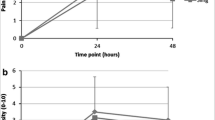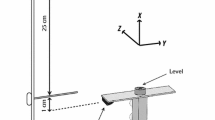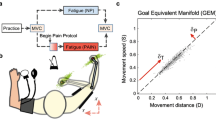Abstract
Conditions known to cause hand pain, such as arthritis, are often accompanied by impaired dexterity. The aim of this study was to determine whether this association is coincident, or whether pain affects dexterity directly. In the first part of the study, several tests of dexterity based on pegboard skills were compared with a precision-grip-lift task: the correlations between the results of any of these tests were not significant at the 0.01 level. Nineteen subjects were then tested with a modified Purdue pegboard test and the precision grip-lift task, both without pain and during pain induced by injection of 5% hypertonic saline into the first dorsal interosseous muscle of the non-dominant hand. There was no significant difference in the performance of either task when the muscle was painful, indicating that acute experimental muscle pain does not affect dexterity.



Similar content being viewed by others
References
Annett M (1992) Five tests of hand skill. Cortex 28:583–600
Barnsley RH, Rabinovitch MS (1970) Handedness: proficiency versus stated preference. Percept Mot Skills 30:343–362
Bellamy N, Sothern RB, Campbell J, Buchanan WW (1991) Circadian rhythm in pain, stiffness, and manual dexterity in rheumatoid arthritis: relation between discomfort and disability. Ann Rheum Dis 50:243–248
Birch L, Graven-Nielsen T, Christensen H, Arendt-Nielsen L (2000) Experimental muscle pain modulates muscle activity and work performance differently during high and low precision use of a computer mouse. Eur J Appl Physiol 83:492–498
Duque J, Thonnard JL, Vandermeeren Y, Sebire G, Cosnard G, Olivier E (2003) Correlation between impaired dexterity and corticospinal tract dysgenesis in congenital hemiplegia. Brain 126:732–747
Eliasson AC, Gordon AM, Forssberg H (1991) Basic co-ordination of manipulative forces of children with cerebral palsy. Dev Med Child Neurol 33:661–670
Ervilha UF, Arendt-Nielsen L, Duarte M, Graven-Nielsen T (2004) The effect of muscle pain on elbow flexion and coactivation tasks. Exp Brain Res 156:174–182
Forssberg H, Eliasson AC, Kinoshita H, Johansson RS, Westling G (1991) Development of human precision grip. I: Basic coordination of force. Exp Brain Res 85:451–457
Forssberg H, Eliasson AC, Redon-Zouitenn C, Mercuri E, Dubowitz L (1999) Impaired grip-lift synergy in children with unilateral brain lesions. Brain 122:1157–1168
Gölge M, Muller M, Dreesmann M, Hoppe B, Wenzelburger R, Kuhtz-Buschbeck JP (2004) Recovery of the precision grip in children after traumatic brain injury. Arch Phys Med Rehabil 85:1435–1444
Gordon AM, Duff SV (1999) Relation between clinical measures and fine manipulative control in children with hemiplegic cerebral palsy. Dev Med Child Neurol 41:586–591
Johansson RS, Westling G (1984) Roles of glabrous skin receptors and sensorimotor memory in automatic control of precision grip when lifting rougher or more slippery objects. Exp Brain Res 56:550–564
Lazarski JP, Ridding MC, Miles TS (2002) Dexterity is not affected by fatigue-induced depression of human motor cortex excitability. Neurosci Lett 321:69–72
Le Pera D, Graven-Nielsen T, Valeriani M, Oliviero A, Di Lazzaro V, Tonali PA, Arendt-Nielsen L (2001) Inhibition of motor system excitability at cortical and spinal level by tonic muscle pain. Clin Neurophysiol 112:1633–1641
Lesley Brown (Ed) (2002) Shorter Oxford English dictionary. 5th edn, Oxford University Press, New york
van Lankveld WG, van ‘t Pad Bosch P, van de Putte L (1998) Predictors of changes in observed dexterity during one year in patients with rheumatoid arthritis. Br J Rheumatol 37:733–739
Wenzelburger R, Kopper F, Frenzel A, Stolze H, Klebe S, Brossmann A, Kuhtz-Buschbeck J, Gölge M, Illert M, Deuschl G (2005) Hand coordination following capsular stroke. Brain 128:64–74
Wenzelburger R, Schattschneider J, Wasner G, Raethjen J, Stolze H, Deuschl G, Baron R (2001) Grip force coordination in CRPS. In: Harden RN, Baron R, Jänig W (eds) Progress in pain research and management, vol 22. IASP Press, Seattle, pp 129–134
Westling G, Johansson RS (1984) Factors influencing the force control during precision grip. Exp Brain Res 53:277–284
Acknowledgment
The support of the Australian Research Council is gratefully acknowledged.
Author information
Authors and Affiliations
Corresponding author
Rights and permissions
About this article
Cite this article
Smith, R., Pearce, S.L. & Miles, T.S. Experimental muscle pain does not affect fine motor control of the human hand. Exp Brain Res 174, 397–402 (2006). https://doi.org/10.1007/s00221-006-0474-y
Received:
Accepted:
Published:
Issue Date:
DOI: https://doi.org/10.1007/s00221-006-0474-y




